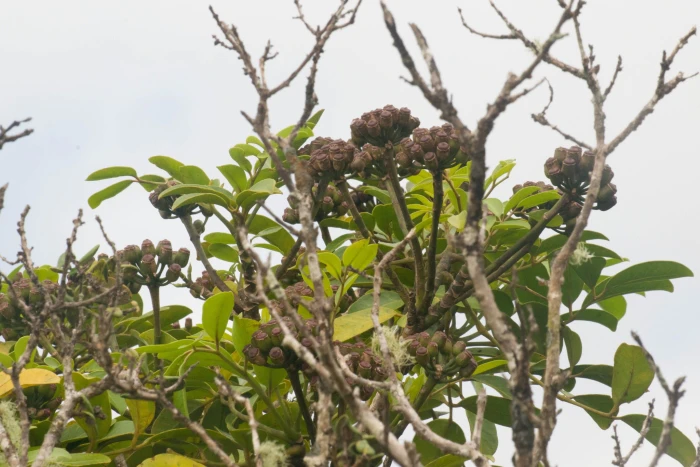’Ohe Mauka
(Polyscias oahuensis)
’Ohe Mauka (Polyscias oahuensis)
/
/

Kevin Faccenda
CC BY 4.0
Image By:
Kevin Faccenda
Recorded By:
Copyright:
CC BY 4.0
Copyright Notice:
Photo by: Kevin Faccenda | License Type: CC BY 4.0 | License URL: http://creativecommons.org/licenses/by/4.0/ | Rights Holder: Kevin Faccenda | Publisher: iNaturalist | Date Created: 2021-10-23T11:55:45-07:00 |

























Estimated Native Range
Climate Requirements for Reston, Virginia
| This Plant | Your Site | Plant Suitability for Your Location | ||
|---|---|---|---|---|
| • Precipitation | 30" - 196" | 41" | Aquatic | Aquatic |
| • High Temp. | 64°F - 88°F | 88°F | Your summer temperatures are normal for this plant. | Excellent |
| • Low Temp. | 20°F - 65°F | 24°F | Your winter temperatures are normal for this plant | Excellent |
This plant should grow well at your location with about N inches per year (Y minutes per month) of irrigation.
Summary
Polyscias oahuensis, commonly known as ’ohe mauka, is a tree endemic to the Hawaiian Islands, except for Niihau and Kahoolawe. It is a member of the Araliaceae family and thrives in the moist to wet forests of the islands’ upland regions. This species typically reaches heights of 15 to 40 feet (4.5 to 12 meters) with a slender trunk and an open canopy. The compound leaves are a distinctive feature, each with 7 to 15 leaflets that are broad and glossy, contributing to the plant’s lush appearance.
’Ohe mauka is valued for its role in native ecosystems and its cultural significance in Hawaii. It is not commonly used in mainstream horticulture but is important for conservation and restoration projects within its native range. In cultivation, it requires a consistently moist environment, rich well-draining soil, and partial to full shade conditions, mimicking its natural forest habitat. While it is not known for significant pest or disease issues, maintaining appropriate moisture levels is crucial for its health. The tree’s fruits are attractive to birds, which aid in seed dispersal, but are not particularly ornamental.CC BY-SA 4.0
’Ohe mauka is valued for its role in native ecosystems and its cultural significance in Hawaii. It is not commonly used in mainstream horticulture but is important for conservation and restoration projects within its native range. In cultivation, it requires a consistently moist environment, rich well-draining soil, and partial to full shade conditions, mimicking its natural forest habitat. While it is not known for significant pest or disease issues, maintaining appropriate moisture levels is crucial for its health. The tree’s fruits are attractive to birds, which aid in seed dispersal, but are not particularly ornamental.CC BY-SA 4.0
Plant Description
- Plant Type: Tree, Shrub
- Height: 8-15 feet
- Width: 4-6 feet
- Growth Rate: Moderate
- Flower Color: N/A
- Flowering Season: Summer
- Leaf Retention: Evergreen
Growth Requirements
- Sun: Part Shade
- Water: Medium
- Drainage: Medium, Slow
Common Uses
Bird Garden, Low Maintenance
Natural Habitat
Moist to wet forests of the Hawaiian Islands’ upland regions
Other Names
Common Names: Oahu aralia, Oahu polyscias
Scientific Names: Polyscias oahuensis, Gastonia oahuensis, Heptapleurum waimeae, Tetraplasandra kaalae, Tetraplasandra kaalae var. multiplex, Tetraplasandra kahanana, Tetraplasandra kohalae, Tetraplasandra lanaiensis, Tetraplasandra lihuensis var. gracilipes
GBIF Accepted Name: Polyscias oahuensis